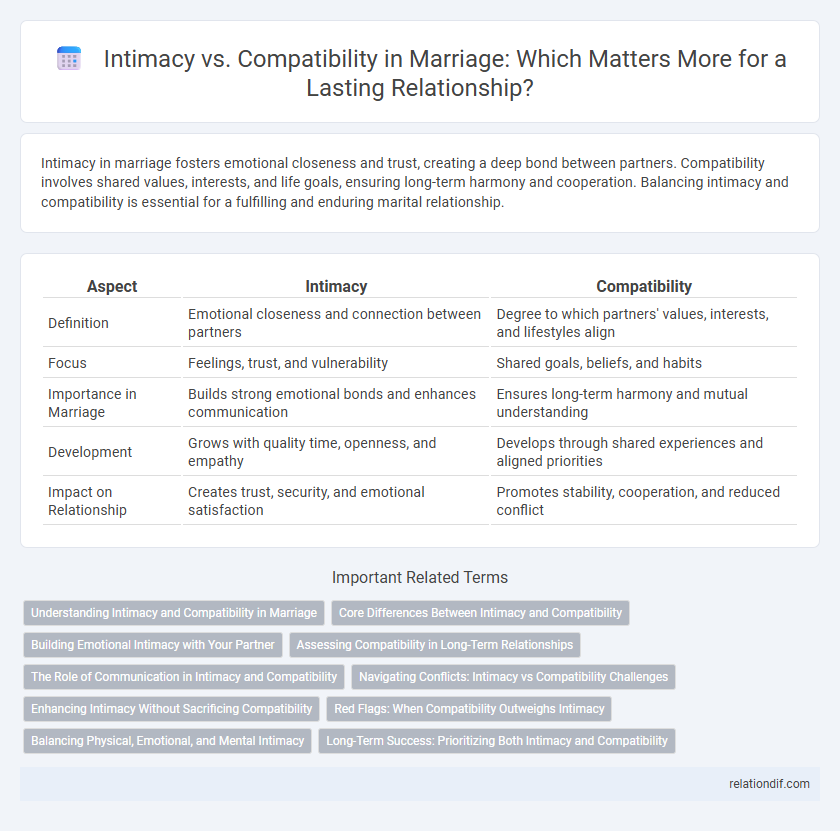Intimacy in marriage fosters emotional closeness and trust, creating a deep bond between partners. Compatibility involves shared values, interests, and life goals, ensuring long-term harmony and cooperation. Balancing intimacy and compatibility is essential for a fulfilling and enduring marital relationship.
Table of Comparison
| Aspect | Intimacy | Compatibility |
|---|---|---|
| Definition | Emotional closeness and connection between partners | Degree to which partners' values, interests, and lifestyles align |
| Focus | Feelings, trust, and vulnerability | Shared goals, beliefs, and habits |
| Importance in Marriage | Builds strong emotional bonds and enhances communication | Ensures long-term harmony and mutual understanding |
| Development | Grows with quality time, openness, and empathy | Develops through shared experiences and aligned priorities |
| Impact on Relationship | Creates trust, security, and emotional satisfaction | Promotes stability, cooperation, and reduced conflict |
Understanding Intimacy and Compatibility in Marriage
Understanding intimacy in marriage involves recognizing emotional closeness, trust, and open communication as foundational elements that strengthen the bond between partners. Compatibility encompasses shared values, lifestyle preferences, and long-term goals that align to create harmony and reduce conflict. Balancing both intimacy and compatibility ensures a resilient and fulfilling marital relationship.
Core Differences Between Intimacy and Compatibility
Intimacy in marriage centers on emotional closeness, trust, and vulnerability between partners, fostering deep personal connection and affection. Compatibility involves aligning values, lifestyle choices, and long-term goals, ensuring harmony in daily life and decision-making. Understanding that intimacy nurtures emotional bonding while compatibility supports practical cooperation is crucial for sustaining a balanced and fulfilling marriage.
Building Emotional Intimacy with Your Partner
Building emotional intimacy with your partner strengthens the foundation of a lasting marriage by fostering trust, vulnerability, and deep connection. Prioritizing open communication and active listening enhances mutual understanding, allowing both partners to feel valued and supported. Emotional intimacy cultivates a safe space for sharing fears, dreams, and desires, which promotes compatibility and resilience through life's challenges.
Assessing Compatibility in Long-Term Relationships
Assessing compatibility in long-term relationships requires evaluating shared values, communication styles, and life goals to ensure a strong foundation beyond physical intimacy. Emotional connection and mutual respect often predict relationship satisfaction more reliably than initial attraction or passion alone. Couples who invest in understanding each other's priorities and conflict resolution methods experience higher stability and deeper intimacy over time.
The Role of Communication in Intimacy and Compatibility
Effective communication strengthens intimacy and enhances compatibility by fostering emotional understanding and trust between partners. Open dialogue allows couples to express desires, resolve conflicts, and align expectations, which supports deeper connection and long-term relationship satisfaction. Consistent, empathetic communication serves as a foundation for both emotional closeness and shared values in marriage.
Navigating Conflicts: Intimacy vs Compatibility Challenges
Navigating conflicts in marriage requires balancing intimacy and compatibility, as emotional closeness fosters understanding while shared values ensure long-term harmony. Couples facing intimacy challenges must communicate openly to rebuild trust and connection, whereas compatibility issues often require compromise and aligning life goals. Addressing these differences proactively helps prevent resentment and strengthens the marital bond over time.
Enhancing Intimacy Without Sacrificing Compatibility
Enhancing intimacy in marriage involves deepening emotional connection and communication while preserving compatibility in values, lifestyle, and goals. Couples who prioritize both emotional closeness and shared interests foster a balanced relationship where passion and practicality coexist. Maintaining this dynamic supports long-term satisfaction and resilience against common marital challenges.
Red Flags: When Compatibility Outweighs Intimacy
When compatibility outweighs intimacy in marriage, red flags such as emotional disconnect and lack of genuine affection often emerge. Couples might share similar values, goals, or lifestyles yet struggle with communication and emotional closeness, signaling potential long-term dissatisfaction. Detecting these warning signs early is crucial to address underlying issues before they escalate into deeper relational problems.
Balancing Physical, Emotional, and Mental Intimacy
Balancing physical, emotional, and mental intimacy is essential for a successful marriage, enhancing connection beyond mere compatibility. Couples who nurture all three dimensions experience deeper trust, improved communication, and sustained passion. Prioritizing this holistic intimacy fosters resilience, satisfaction, and long-term relational harmony.
Long-Term Success: Prioritizing Both Intimacy and Compatibility
Long-term success in marriage hinges on balancing intimacy and compatibility, as emotional closeness fosters trust while shared values and goals ensure stability. Couples who nurture both physical and emotional intimacy alongside compatible interests and communication styles build resilient relationships. Prioritizing regular quality time and open dialogue strengthens bonds, making marriages more adaptable to life's challenges.
Intimacy vs Compatibility Infographic

 relationdif.com
relationdif.com